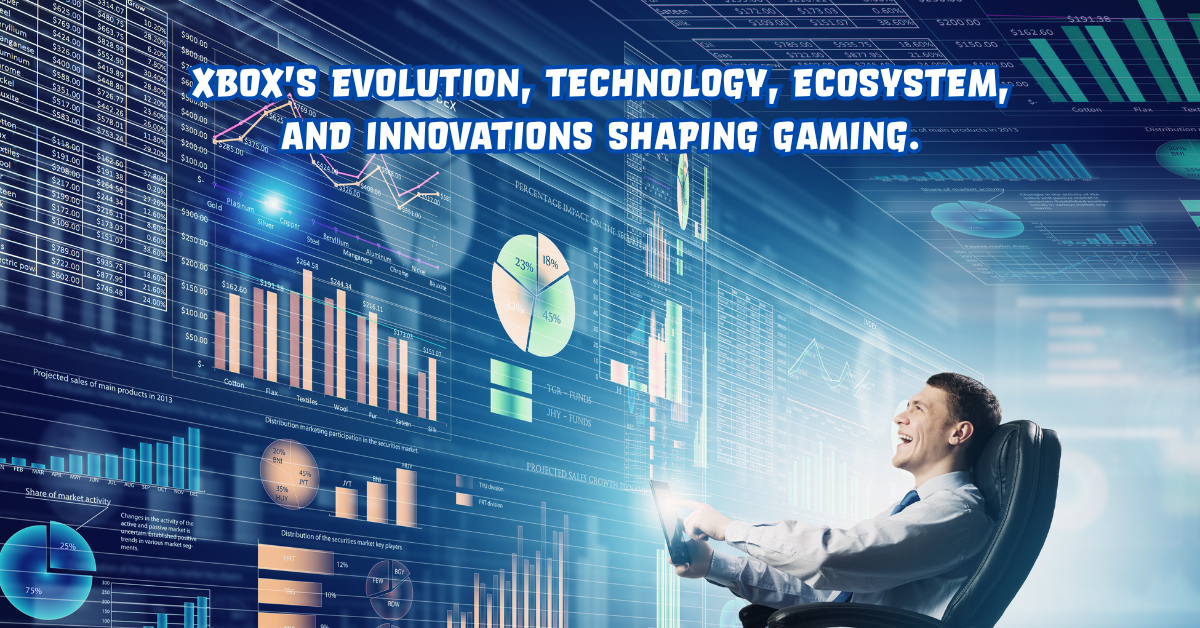The Xbox is not merely a gaming console—it is a digital ecosystem that embodies the modern era of interactive entertainment. Within the first 100 words, let’s answer the searcher’s intent: Xbox’s represents Microsoft’s ambitious vision to unify gaming, media, cloud technology, and social connection into one seamless platform. It’s more than a device for playing games—it’s a cultural phenomenon influencing how people play, compete, and connect globally. In 2025, Xbox’s continues to innovate through hardware evolution, immersive gaming experiences, AI integration, and cloud-based services that redefine what gaming can be for the next decade. This article dives deeply into the story, strategy, and future of Xbox’s, written in the style of long-form investigative journalism, revealing not just what it is—but what it stands for.
The Legacy and Evolution of Xbox’s: From Console to Global Platform
When Microsoft entered the gaming market in 2001 with the original Xbox, few predicted that it would grow into one of the most influential entertainment platforms in the world. What began as a bold challenge to Sony’s PlayStation dominance has now evolved into an ecosystem that transcends hardware. The Xbox’s brand today represents an interconnected network of devices, services, and communities.
From the first console’s iconic green “X” logo to the sleek modern designs of the Xbox’s Series X and S, the transformation reflects Microsoft’s larger ambition: to make gaming accessible to everyone, everywhere. Xbox has moved beyond the living room; it now thrives on mobile devices, PCs, and the cloud. As Phil Spencer, the head of Xbox’s, once said, “Gaming is not defined by a box—it’s defined by the people who play.”
Hardware Innovation: The Power Behind the Xbox
The latest Xbox Series X and Series S continue to represent the technological pinnacle of console gaming. With custom AMD processors, real-time ray tracing, ultra-fast SSDs, and 4K capabilities, Xboxs’ delivers cinematic realism and near-instant loading speeds.
Table 1: Comparison Between Xbox’s Series X and Xbox Series S
| Feature | Xbox Series X | Xbox Series S |
|---|---|---|
| Processor | 8-core AMD Zen 2, 3.8GHz | 8-core AMD Zen 2, 3.6GHz |
| Graphics | 12 TFLOPS GPU | 4 TFLOPS GPU |
| Memory | 16GB GDDR6 | 10GB GDDR6 |
| Storage | 1TB NVMe SSD | 512GB NVMe SSD |
| Resolution | True 4K | Up to 1440p |
| Optical Drive | 4K UHD Blu-ray | Digital Only |
| Target Audience | Hardcore gamers, 4K displays | Casual gamers, budget-friendly option |
The Series X is aimed at enthusiasts seeking the ultimate performance, while the Series S appeals to digital-first players and families. The focus isn’t just on specs—it’s on delivering an experience where transitions are seamless, gameplay fluid, and visuals lifelike.
Microsoft’s engineering philosophy centers on modular compatibility—new consoles retain backward compatibility with older generations, ensuring players never lose access to their favorite titles. This legacy-first approach has made Xbox a trusted ecosystem.
Game Pass: The Heart of the Xbox Experience
Arguably, the most revolutionary aspect of Xbox’s isn’t hardware—it’s Xbox Game Pass. This subscription service has fundamentally changed how players consume games. Instead of purchasing titles individually, subscribers get access to hundreds of games for a monthly fee, including first-party releases from Microsoft Studios.
This model mirrors Netflix’s transformation of media consumption. Game Pass bridges console, PC, and cloud, giving players flexibility to play wherever they are. It democratizes gaming by removing the barrier of high software costs. “It’s not just a subscription—it’s a movement,” wrote one industry analyst. Indeed, the service has attracted millions worldwide, and its integration with Xbox’s Cloud Gaming allows even non-console owners to experience Xbox’s games on tablets, smartphones, or web browsers.
The Cloud Era: Xbox Cloud Gaming and Accessibility
Xbox’s Cloud Gaming (formerly Project xCloud) is Microsoft’s answer to the future of gaming—a cloud infrastructure that streams games directly without requiring high-end hardware. Through Azure data centers, players can access console-quality games on mobile devices with minimal latency.
The technology symbolizes inclusivity. Someone in a small town without access to expensive consoles can now play Halo Infinite or Forza Horizon using only a controller and an internet connection. This approach aligns with Microsoft’s goal to “empower every gamer on the planet.”
The synergy between Xbox’s Cloud Gaming and Game Pass is critical. Every new title added to Game Pass instantly becomes accessible via the cloud, eliminating downloads and storage issues.
Xbox Ecosystem: Integration Across Devices
Xbox is no longer confined to a single device; it’s an integrated platform across consoles, PCs, and mobile devices. Players can start a game on their Xbox console, continue on a PC, and finish on a smartphone. This cross-device continuity is part of Microsoft’s “Play Anywhere” initiative.
Integration also extends to Windows 11, where Xbox services like Game Pass, Game Bar, and DirectStorage are built into the operating system. This unification is designed to blur the boundaries between console and PC gaming.
Even social and communication features like Xbox Live and Xbox Cloud Saves ensure a player’s progress, friends, and achievements remain synchronized across platforms.
The Future of Gaming Studios and Exclusive Titles
The backbone of any console’s success lies in its game library. Microsoft has aggressively expanded its first-party studios under Xbox Game Studios, acquiring renowned developers such as Bethesda, Ninja Theory, and Obsidian.
Exclusive franchises like Halo, Forza, and Fable remain cornerstones of the Xbox identity. Yet, the company’s acquisition strategy also focuses on diversity—indie games, story-driven adventures, and family-friendly content receive equal investment.
Notably, Microsoft’s acquisition of Activision Blizzard in 2023 reshaped the industry landscape. With franchises like Call of Duty and Diablo now under the Xbox umbrella, Game Pass became even more compelling.
This move reflects a shift from console wars to ecosystem wars—where content, access, and value trump hardware alone.
Table 2: Major Xbox Game Studios and Their Flagship Titles
| Studio Name | Notable Games | Genre Focus |
|---|---|---|
| 343 Industries | Halo Infinite, Halo Series | First-Person Shooter |
| Turn 10 Studios | Forza Motorsport | Racing Simulation |
| Obsidian Entertainment | Avowed, The Outer Worlds | RPG / Story-driven |
| Playground Games | Fable, Forza Horizon | Open-world Adventure |
| Bethesda Game Studios | Starfield, Elder Scrolls, Fallout | RPG / Sandbox |
| Ninja Theory | Hellblade II: Senua’s Saga | Action Adventure |
Each studio contributes uniquely to Xbox’s creative portfolio, emphasizing variety and artistic depth. The result is a catalog that appeals to casual gamers and storytelling enthusiasts alike.
Community, Connectivity, and Culture
Xbox has always prioritized building a community-driven culture. With Xbox Live, gamers from around the world connect through multiplayer modes, leaderboards, and shared experiences. Today, over 100 million players interact through Xbox Live each month, making it one of the world’s most active online gaming communities.
Accessibility remains a defining pillar. Microsoft’s Adaptive Controller, launched in 2018, broke barriers for gamers with disabilities. It remains one of the industry’s most lauded innovations, setting a new standard for inclusivity.
Moreover, Xbox’s initiatives like Game Accessibility Guidelines and customizable UI features continue to expand gaming’s reach. The message is clear: gaming is for everyone.
Xbox in the Era of Artificial Intelligence
Artificial intelligence is quietly revolutionizing how Xbox delivers personalized experiences. AI algorithms now predict a player’s preferences, recommend games, and optimize in-game experiences. Through AI-driven compression and rendering, visuals are sharper and smoother, even on lower-end hardware.
Xbox’s AI-driven moderation tools monitor online environments to promote respectful interactions. The platform’s “Safety Dashboard” allows players and parents to set customized content limits. This ethical approach to gaming safety strengthens trust between Xbox and its global audience.
Economic Impact and the Global Market
The Xbox economy extends far beyond game sales. It fuels a massive ecosystem of developers, content creators, streamers, and hardware manufacturers. The synergy between Xbox consoles, PC gaming, and cloud streaming opens vast economic opportunities across markets.
The Indian gaming market, for example, has emerged as a key growth region. Microsoft is introducing localized pricing, digital payment support, and regional Game Pass catalogs. Meanwhile, in Western markets, subscription revenues are reshaping profitability models—steady monthly income replaces unpredictable retail spikes.
Analysts estimate that by 2030, subscription-based gaming could account for 60% of total Xbox revenue. This model not only stabilizes earnings but also ensures continuous engagement between brand and user.
Xbox and Environmental Responsibility
As sustainability becomes central to corporate strategy, Microsoft has pledged to make Xbox a carbon-negative platform by 2030. The latest consoles feature energy-efficient modes, recycled materials, and reduced plastic packaging.
The Xbox Carbon Aware Update, introduced in 2023, adjusts system updates to run during hours when renewable energy is most available. These efforts represent a larger movement—where technology and sustainability intersect to shape responsible entertainment.
The Competitive Landscape
The battle between Xbox, PlayStation, and Nintendo remains fierce, but Xbox’s focus on ecosystem rather than exclusivity differentiates it. Sony still dominates hardware sales in many regions, yet Microsoft’s cloud and subscription strategies expand reach beyond console owners.
PC integration, mobile compatibility, and Game Pass access on rival platforms mean Xbox is less a “box” and more an identity. This inclusive approach allows Microsoft to focus on player engagement over hardware rivalry.
Analysts argue that by 2027, the concept of console exclusivity will fade, replaced by multi-platform ecosystems where Xbox may lead through accessibility and service excellence.
The Social and Cultural Influence of Xbox
Beyond technology, Xbox has influenced pop culture profoundly. From esports tournaments to Twitch streaming and cosplay, Xbox’s franchises define gaming’s visual language. Titles like Halo and Gears of War have inspired novels, TV shows, and cinematic adaptations.
The Xbox community fosters digital citizenship—players collaborate globally, share achievements, and participate in charity gaming marathons like Gamers for Good. It’s no longer just entertainment—it’s social engagement with impact.
As one commentator noted, “Xbox isn’t selling consoles anymore—it’s selling culture.”
The Role of Cloud Partnerships and Cross-Industry Collaborations
Microsoft’s Azure infrastructure gives Xbox an edge in global scalability. Strategic partnerships with telecom operators, device manufacturers, and content providers make the service ubiquitous. Xbox Cloud Gaming integration with Samsung smart TVs, for example, allows gaming without a console.
This future—console-free gaming—may define the next decade. The Xbox app will likely become the gateway to an entire entertainment universe that spans film, gaming, music, and live events.
Accessibility and Localization: Reaching Every Gamer
Localization plays a key role in expanding Xbox’s footprint. From language support in regional dialects to culturally adapted marketing campaigns, Xbox’s strategy acknowledges the importance of inclusivity.
New accessibility initiatives include customizable subtitles, adaptive difficulty levels, and local payment gateways. These efforts aim to ensure that no gamer feels left out, regardless of geography or background.
What Lies Ahead: The Future of Xbox
By 2030, Xbox envisions a fully integrated gaming universe—AI-powered, cloud-supported, and sustainability-driven. Players may soon experience personalized worlds generated dynamically by AI, where every choice alters the narrative in real time.
Virtual and augmented reality are also expected to merge into the Xbox ecosystem, expanding immersion. With advanced haptic feedback and sensory mapping, players will feel the virtual environment.
Above all, the Xbox brand is expected to lead the post-console era, where hardware becomes invisible, and the experience becomes everything.
FAQs
1. What makes Xbox different from PlayStation or Nintendo?
Xbox focuses on ecosystem accessibility through services like Game Pass and Cloud Gaming, while PlayStation emphasizes exclusives. Xbox’s goal is to make gaming available on any device, breaking hardware barriers.
2. Is Xbox Game Pass worth the subscription cost?
Yes, Xbox Game Pass offers hundreds of games for a monthly fee, including new releases. For frequent gamers, it provides unmatched value and flexibility across console, PC, and cloud platforms.
3. Can I play Xbox games without owning a console?
Absolutely. With Xbox Cloud Gaming, you can stream console-quality games on smartphones, tablets, or PCs using just a controller and stable internet.
4. How does Xbox contribute to sustainability?
Microsoft has pledged carbon-negative goals by 2030. Energy-efficient consoles, recyclable packaging, and carbon-aware updates are key initiatives driving eco-conscious gaming.
5. What is the future of Xbox?
The future lies in a cloud-driven, AI-enhanced, and device-agnostic ecosystem. Expect Xbox to evolve beyond consoles into a fully immersive, global gaming service that redefines digital entertainment.
Conclusion
The Xbox in 2025 stands at the intersection of technology, culture, and creativity. It embodies more than gaming—it is a living ecosystem connecting people, platforms, and possibilities. From hardware innovation to cloud accessibility, from community inclusion to sustainability, Xbox continues to shape how the world plays and interacts.
Its story is one of reinvention: from a black console in 2001 to a boundless digital realm today. As gaming evolves into an integral part of global culture, Xbox remains at its forefront—a pioneer redefining entertainment for a connected generation that seeks not just to play, but to belong.











